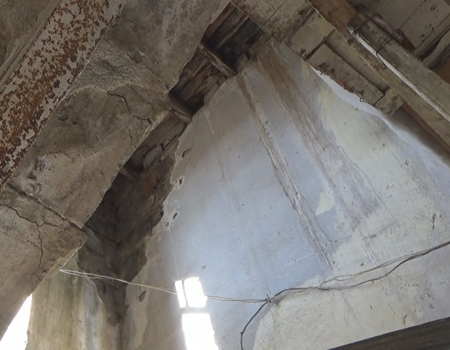For years, 22 families of the village of Lenughi in Armenia's Armavir province have been living in two buildings unfit for human habitation; in 1988, the buildings were recognized as being of 4th degree emergency, while authorities periodically promise to provide the tenants with new apartment. This year, the regional administration was supposed to initiate a priority program and provide the villagers with money for new housing; however, the desigated funds were redirected to other projects. In early November, the residents of the buildings appealed to government officials but were sent back to the regional administration, where they were once again urged to wait.
On November 18, Epress.am reporters visited Lenughi and were greeted by the villagers in the courtyards of the dilapidated buildings. It was obvious at first glance that the apartment buildings were unsafe and unfit for living: they looked as if they would collapse from a light breeze. The tenants were interrupting each other telling that the buildings were wood-based, did not have a functioning sewer system, that they were too scared to go up to the second floor and that they had to move gingerly in their apartments.
The villagers no longer believe the promises of officials; they have received numerous letters of assurances from authorities, but nothing ever changes, they say.
“Every time we go to the regional administration, they promise to resolve the issue 'next month.' They have been lying to us since 1988; we were to be provided with apartments in the past year, but they said they had to redirect the money to help frost-affected farmers,” Anush Tovmasyan told Epress.am.
The tenants received the latest letter from regional officials on November 10; it said that the issue was included in the highest priority programs for 2016 and would be resolved as soon as funds became available. Speaking to Epress.am, Armavir governor Ashot Ghahramanyan's assistant, Nver Petrosyan, insisted that the regional administration had to allocate the entire 2016 “high priority” budget to farmers who had suffered hail damage, and that the 2017 funds would be used only for helping the Lenughi residents. “The regional budget is allocated by the government; we decide what to spend the money on,” he added.
“Hail-affected farmers received no help from them,” Tamara Khachatryan, another resident of the dilapidated buildings, told us, claiming that her crops had also been damaged by hail and she personally received no money from regional authorities. “They claim that they can't help us because they have given the entire money to those affected by hail. I, for one, have yet to receive any aid. But they will be sure to draft my son into the army. Why should my child serve this country when he is not even provided with proper housing?”
Residents of the third emergency building in Lenughi were given money from the 2015 regional budget – 6,6 million drams (about $13 700) per family, villager Gayane Poghosyan said; “The governor said then that the allocations would be made in 3 stages. Residents of the building in the middle received their money in the first stage and left, while we are still stuck here.”
The buildings, which were build in 1935, have no running water, no toilet facilities, and no heating system. Anush Tovmasyan's family are believed to some of the “lucky ones” because they live on the ground floor and have access to an outdoor toilet used by a total of 20 people. The tenants on the second floor, meanwhile, have to use a bucket toilet placed in the hallway.
The residents say they have somewhat strengthened the foundation of the building by their own means, but repairing roof damage was too costly; “Rainwater pours into the apartments through the ceiling; kids suffer from bronchitis year round; houses are full of rats…”
 Epress.am News from Armenia
Epress.am News from Armenia

